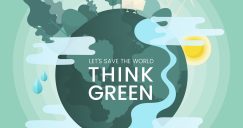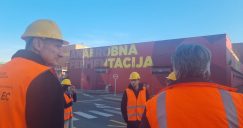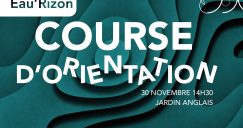Sustainable Fisheries & Marine Conservation Workshop in Cyprus
What does being a small-scaled Fisherman in Cyprus look like in these ever-changing times of globalization and mechanization? What is being done to preserve the profession and protect the fishermen and their traditions from big-scale fisheries and climate change-driven negative occurrences?
As part of the Horizon Europe LEVERS project, Enalia Physis and CSI Cyprus came together to organise a Workshop, educate, as well as listen to the fishermen, and address these exact questions. The Workshop took place on four different days, in four different cities of Cyprus, Larnaka, Zigi, Paphos and Limassol, in mid-July and included a presentation on data from the EU and Cyprus on fisheries and sustainable fishing methods, an educational clip on safe release of bycatch (with a focus on the critically endangered Angel shark),a demonstration of the traditional fishing instrument the “Skarka”, and an in depth discussion with the fishermen on their thoughts and concerns.
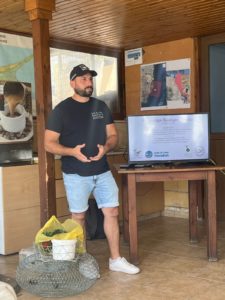 Notes From the Presentation
Notes From the Presentation
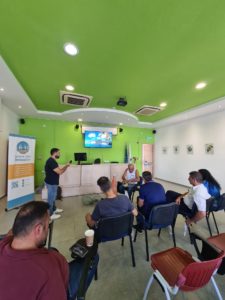 In Cyprus, marine capture fisheries generate roughly €7.4 million which means approximately 0.3% of our GDP; a very small percentage. This may explain the recent neglect the profession is facing from the governmental sectors. Another important part of the presentation was the showcase of sustainable fishery in different countries and regions, emphasizing that when used correctly, sustainable fishing methods do exist and offer positive results with a positive impact on our climate charge. The educational video on bycatch offered a step-by-step guidance on how to safely release such fish back into the sea, emphasizing the importance of minimizing injury not only for Angelsharks, the protagonist of the video, but for all marine life. This sparked a thoughtful conversation on the ethical and ecological responsibility fishermen carry when handling bycatch and how small, mindful actions can help protect vulnerable species and restore declining fish populations.
In Cyprus, marine capture fisheries generate roughly €7.4 million which means approximately 0.3% of our GDP; a very small percentage. This may explain the recent neglect the profession is facing from the governmental sectors. Another important part of the presentation was the showcase of sustainable fishery in different countries and regions, emphasizing that when used correctly, sustainable fishing methods do exist and offer positive results with a positive impact on our climate charge. The educational video on bycatch offered a step-by-step guidance on how to safely release such fish back into the sea, emphasizing the importance of minimizing injury not only for Angelsharks, the protagonist of the video, but for all marine life. This sparked a thoughtful conversation on the ethical and ecological responsibility fishermen carry when handling bycatch and how small, mindful actions can help protect vulnerable species and restore declining fish populations.
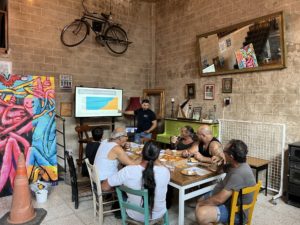
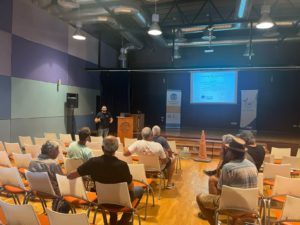
Why Skarka Matters
Skarka uses a woven or wire basket, baited with specific leaves and placed near underwater vegetation. After a few hours, it’s retrieved often with target species inside. Because it’s selective and gentle, it helps reduce bycatch and limits harm to turtles and dolphins; one reason participants were keen to revisit and adapt it. The skarka is also very hard to damage in comparison to fishing nets, and so reduces a lot of waste in the making, harms less life and is cheaper for the fisherman. Lastly, the skarka method goes back hundreds of years and requires special skills to build. Only a few people on the island still have this knowledge and the skills to make this basket and it is therefore crucial to uplift this tradition, safeguarding our culture, the fish, the environment and the fishers.
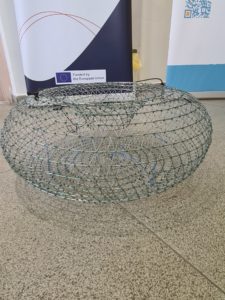
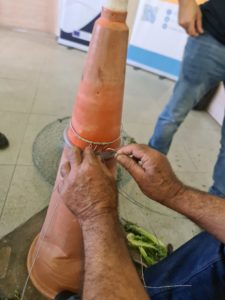
What We Learned About Waste
Waste management remains a persistent challenge: fishing crews typically return with around 1 kg of waste per trip, including plastic bottles and bags, metal scraps, and coffee cups, while also dealing with organic residues. However, ports currently lack recycling facilities for both types of waste. Fishers have requested dedicated bins for plastics and organics, or refrigerated storage for organic waste, as well as improved coordination among relevant authorities.
We explored the idea of forming upcycling partnerships with artists or companies that can transform the retrieved materials into useful prod
ucts—ensuring that what comes out of the sea re-enters the community with added value. The fishers expressed strong interest in this initiative. One potential collaborator is The Precious Plastic Company, a core partner of Cyprus Learning Venture, which has expressed willingness to support small-scale fishers in upcycling plastic nets.
The Fishermen’s Concerns
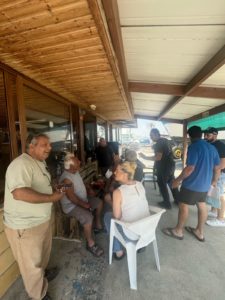
Cyprus’ small-scale fishers described a steady decline in stocks and growing uncertainty about the future of the profession, stressing the need to pass skills to younger generations. Daily realities include repeated gear damage from interactions with turtles and dolphins and the risk of bycatch. They pointed to policy and support gaps that leave them economically exposed declining catches, damaged nets and climate change all compound to
financial insecurity and heighten their vulnerability. Beyond information, they want tangible infrastructure, sustained policy attention, and ongoing collaboration with scientists and public bodies and, crucially, inclusion in decision-making as environmental stewards whose traditional knowledge should help guide solutions.
Moving forward, supporting small-scale Fishermen and uplifting the profession and the tradition
From deck to policy, the path is clear: bring small-scale fishers into participatory policy development from the start so rules reflect real conditions at sea and can adapt as those conditions change; contextualise learning solutions by treating every trial—skarka revival, safe-release routines, port-bin pilots—as a learning venture with short feedback loops and package the results in short, usable briefs for municipalities and ministries; and sustain multi-actor engagement so fishers’ lived expertise travels with scientists, local councils, port authorities, and recyclers/up cyclers from boat to port to policy and collaboration.
This is exactly where LEVERS stands out, connecting place-based practices with policy and education so that effective local solutions don’t remain hidden. It was a warm and inspiring series to co-host, and we extend our heartfelt thanks to the fishers who joined us between tides, arriving straight from work, bringing stories, healthy skepticism, and practical solutions. We’re deeply grateful for their trust and look forward to continuing to build the next steps together.



